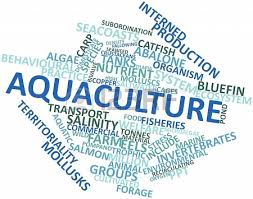
We touched on the Tilapia industry last week so I thought maybe we should look at Aquaculture. Does it fit in with a sustainable agriculture? I feel that it certainly has a place in sustainability of our food products. So….
What is Aquaculture?
 Aquaculture refers to the breeding, rearing, and harvesting of plants and animals in all types of water environments. Aquaculture serves a variety of purposes. Most U.S. marine aquaculture is shellfish while a small percentage is marine finfish. [credit: NOAA Aquaculture Office]
Aquaculture refers to the breeding, rearing, and harvesting of plants and animals in all types of water environments. Aquaculture serves a variety of purposes. Most U.S. marine aquaculture is shellfish while a small percentage is marine finfish. [credit: NOAA Aquaculture Office]Aquaculture — also known as fish or shellfish farming — refers to the breeding, rearing, and harvesting of plants and animals in all types of water environments including ponds, rivers, lakes, and the ocean. Researchers and aquaculture producers are “farming” all kinds of freshwater and marine species of fish, shellfish, and plants. Aquaculture produces food fish, sport fish, bait fish, ornamental fish, crustaceans, mollusks, algae, sea vegetables, and fish eggs. For more information check out the National Oceanic and Atmospheric Administration NOAA.
Aquaculture is a great advantage in producing quality food products for our consumption. Aquaculture is becoming an increasingly important source of food available for human consumption. As the number of aquaculture facilities grows, so does the need to develop safe and effective drugs for treating fish diseases. The FDA’s Center for Veterinary Medicine (CVM) Office of New Animal Drug Evaluation (ONADE) is working with various government agencies and aquaculture associations to increase the number of safe and effective drugs that can be used by the aquaculture industry. The Minor Use and Minor Species Animal Health Act of 2004 is playing a critical role in making more medications legally available to veterinarians and animal owners to treat minor animal species such as fish. Additionally, CVM’s Office of Research (OR) has greatly expanded its commitment to aquaculture research. I think with these statements from the FDA that we need to be cautious that we don’t start to develop the same scenario that we have going on in the beef industry today. The use of to many antibiotics and growth enhancers to produce a product faster. As technologies move forward they are hard pressed to get a product to market as fast as they can. Now don’t get me wrong here, I am all for technology enhancing the industry, just don’t let it stay with the product till it gets to my plate. Software, machinery, or material things that get the job done faster are good. We have to come to grips with the end result. I believe we need more long term studies on the effects we are seeing in our future generations. We have to realize that our products will be consumed by our children and their children. I am concerned with our future.
Another aspect we need to consider…
Aquaculture is a huge industry, and the world’s fastest growing food sector. It’s worth a massive US$56 billion globally and provides one-third of the fish people consume. When done properly, some forms of aquaculture can indeed help take pressure off wild fisheries and provide needed income to coastal communities. However, as production rises, so too can aquaculture’s impacts on the environment and wild marine species, through:
competition for space
pollution
escaped farmed fish
parasites and disease
the use of wild-caught fish for fish feed
the use of wild-caught fish for farming
conflict with predators, such as seabirds, seals, and starfish
Again be an informed consumer. Know your food and products. You can help remember-